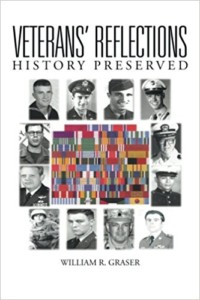Title: Veterans’ Reflections: History Preserved
Author: William R. Graser
Publisher: iUniverse
ISBN: 978-1-4917-7285-0
Pages: 302
Genre: History / United States / 20th Century/ 21st Century
Reviewed by: Barbara Bamberger Scott
Pacific Book Review Star
Awarded to Books of Excellent Merit

Some of the best history is personal—that which is collected from participants in great events and movements. In William R. Graser’s book, Veterans’ Reflections, we are offered stories and vignettes from those who serve in the United States military, in their own words.
Sergeant First Class William R. Graser, USA (Ret) worked for the US Army Security Agency overseas and in America. In 2007, Graser conceived the simple but ingenious idea of letting soldiers tell their own stories and through this framework, offer a picture of sixty-three years of American military history. His sixty interviews comprise the experiences of military personnel from World War II beginning in 1941, through the Cold War, the Korean War, the Vietnam War, and what the author refers to as the Quiet War Korea (aka Korean DMZ Conflict). The last stories come from Global and Homeland Service, up to 2004.
Each segment starts with an explanation of the conflict, its background and causes, followed by interviewee accounts. The first such account comes from Clement Hutchins, age 93 in 2011, who served in World War II with the Merchant Marines. In the North Atlantic, prey to attacks from the German “Wolf Pack” submarines, Hutchins recalls “one evening in particular when nine merchant ships were sunk in less than fifteen minutes.” Samuel Masessa was an infantryman in Korea, where, he states, “the cold became the enemy.” He recounts a battle between American tanks and Chinese troops in a sudden attack that left many enemy soldiers dead; he and his comrades then used flamethrowers to destroy the bodies in a grim task “to prevent disease and eliminate the smell.”
Harry Dalton was a K9 dog handler in Vietnam who was awarded numerous medals but stated “I was proud to serve but prefer to keep most of my experiences to myself.” Another soldier, Richard Matthews who served in the US Air Force in the sky over Cambodia and Laos, expresses a similar sentiment: “I don’t make a lot of noise about my awards and decorations. In reality we were just soldiers, airmen, marines, sailors and guardians doing what we were trained to do and dedicated to doing.”
By allowing veterans to express their sentiments and describe their very real and harrowing experiences, Graser has done honor to these individuals who served us so bravely and unselfishly. He offers an intelligent analysis of the stages of war and conflict that the US was engaged in during the book’s timeframe. He includes useful appendices of military terms, acronyms, and pictures of military medals.
Graser wrote Veterans’ Reflections: History Preserved to increase our general understanding of American warfare through the eyes of those who were there. He concludes with a phrase that will be familiar to anyone who has a veteran in the family: “When you see a veteran, say thank you!” This book is a remarkable tribute to the sacrifice made by our veterans who fought for our country. Veterans’ Reflections is compelling and inspiring to say the least. Our heroes deserve to be heard.



Follow Us